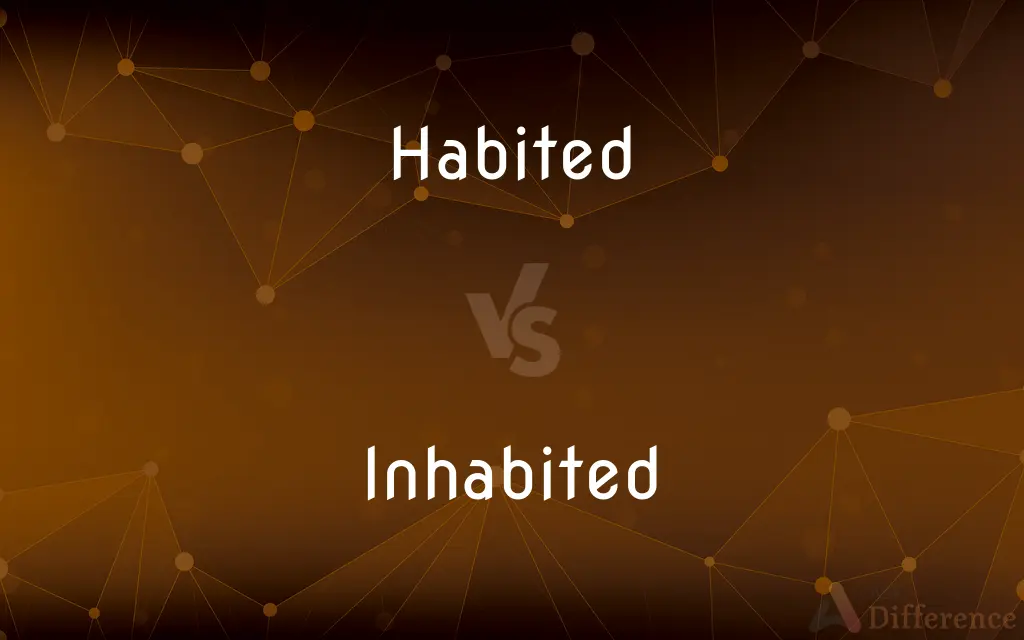Habited vs. Inhabited — What's the Difference?
By Fiza Rafique & Urooj Arif — Updated on February 29, 2024
"Habited" refers to wearing a specific type of clothing or habit, while "inhabited" describes a place where people or animals live.

Difference Between Habited and Inhabited
Table of Contents
ADVERTISEMENT
Key Differences
Habited is primarily used to describe the act of wearing a particular type of clothing or uniform, often associated with religious or traditional attire, such as a nun's habit. It emphasizes the aspect of being dressed in a specific way. Inhabited, on the other hand, pertains to places or spaces where people or animals live, indicating that an area is occupied or settled by living beings.
The term "habited" is less common in everyday language and is mainly used in specific contexts relating to dress or attire, particularly when discussing formal or ceremonial garments. "Inhabited" is a more frequently used term, applicable to a wide range of living situations, from densely populated cities to remote, scarcely populated areas.
Understanding the difference between these terms is essential for clarity in communication, especially when describing the characteristics of people, places, or animals. While "habited" focuses on the external appearance of individuals, "inhabited" gives information about the occupancy and usage of spaces.
"Habited" might be used to convey specific cultural or societal norms related to clothing, offering insights into the identities and roles of individuals. "Inhabited," however, often sets the scene or context within a narrative, indicating the presence of life and activity within a particular setting.
The distinction between habited and inhabited highlights the diverse ways in which English language terms can evolve and specialize, reflecting the nuanced differences in human culture, society, and environment.
ADVERTISEMENT
Comparison Chart
Definition
Wearing specific clothing or habit
Occupied by people or animals
Context
Related to attire or dress
Pertains to living spaces
Usage Frequency
Less common, specific contexts
More common, broad application
Significance
Indicates specific attire
Indicates presence of life
Application
Mainly in formal or religious settings
Any occupied space or location
Compare with Definitions
Habited
Dressed in a specific uniform.
The monks were habited in their traditional robes.
Inhabited
Having residents.
The building has been inhabited since the 18th century.
Habited
Adorned with a specific habit.
The nuns are habited in black and white.
Inhabited
Lived in by people or animals.
The island was inhabited by a small community.
Habited
Wearing a distinctive attire.
She was habited in a ceremonial gown for the event.
Inhabited
Filled with life.
The coral reef is inhabited by diverse marine species.
Habited
Describes a form of dressing.
He was habited as a knight for the medieval festival.
Inhabited
Occupied as a residence.
The ancient ruins were once inhabited by a prosperous civilization.
Habited
Clothed in a particular way.
Participants were habited in period costumes for the reenactment.
Inhabited
Used to describe occupied places.
The forest is inhabited by various wildlife.
Habited
To clothe; dress.
Inhabited
Having inhabitants; lived in.
Habited
Clothed; arrayed; dressed; as, he was habited like a shepherd.
Inhabited
Having inhabitants; lived in;
The inhabited regions of the earth
Habited
Dressed in a habit;
The habited men of the monastery
Common Curiosities
What does "inhabited" mean?
"Inhabited" describes a place where people or animals live, indicating that it is occupied or settled.
How do you use "habited" in a sentence?
"The performers were habited in elaborate costumes for the play."
What does "habited" mean?
"Habited" refers to wearing a specific type of clothing or uniform, often related to religious or ceremonial attire.
Can a place be "habited"?
Typically, "habited" is not used to describe places; it refers to individuals wearing specific attire.
How is "inhabited" used in context?
"The once-abandoned village is now inhabited by a vibrant community."
Can "inhabited" describe a place with temporary residents?
Yes, "inhabited" can describe places with both temporary and permanent residents.
What significance does "habited" have in religious contexts?
It often signifies wearing a habit, reflecting membership or role within a religious order.
Are there synonyms for "habited"?
Synonyms might include "dressed," "clothed," or "attired," depending on the context.
What's the difference in application between "habited" and "inhabited"?
"Habited" applies to clothing or attire, while "inhabited" relates to living spaces or areas.
Is "inhabited" used only for human settlements?
No, "inhabited" can refer to any living beings, including animals, occupying a place.
Does "inhabited" imply a certain density of population?
No, "inhabited" simply means that a place has residents, regardless of population density.
What are examples of "inhabited" spaces?
Examples include cities, towns, villages, or natural environments where living beings are present.
How does the distinction between "habited" and "inhabited" enhance communication?
It clarifies whether the discussion pertains to the manner of dressing or the occupancy of a place, enhancing specificity and understanding.
How do cultural perceptions of "habited" vary?
Cultural perceptions can influence the significance and interpretation of specific attire or habits.
Can the term "inhabited" apply to extraterrestrial locations?
Theoretically, yes, if life or temporary human presence, such as astronauts, is confirmed.
Share Your Discovery

Previous Comparison
Predict vs. Forecast
Next Comparison
Expectation vs. RealityAuthor Spotlight
Written by
Fiza RafiqueFiza Rafique is a skilled content writer at AskDifference.com, where she meticulously refines and enhances written pieces. Drawing from her vast editorial expertise, Fiza ensures clarity, accuracy, and precision in every article. Passionate about language, she continually seeks to elevate the quality of content for readers worldwide.
Co-written by
Urooj ArifUrooj is a skilled content writer at Ask Difference, known for her exceptional ability to simplify complex topics into engaging and informative content. With a passion for research and a flair for clear, concise writing, she consistently delivers articles that resonate with our diverse audience.
















































